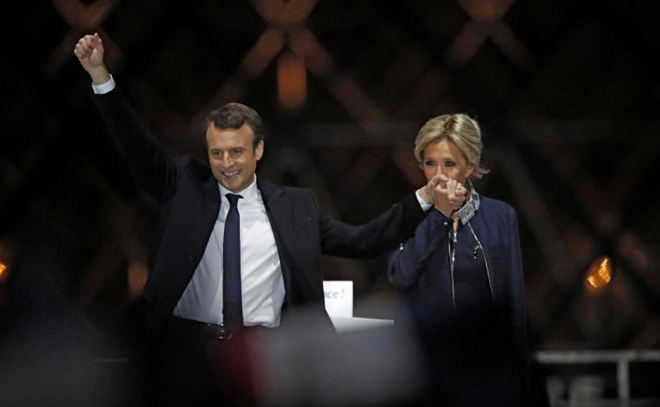Macron wins French presidency, to sighs of relief in Europe
- Macron's French presidential campaign emails leaked online
- Macron and Le Pen to square off in French pre-election TV debate
- French amphibious carrier visits Japan ahead of Pacific show of power
- Hollande urges French to reject Le Pen in presidential run-off vote
The centrist's emphatic victory, which also smashed the dominance of France’s mainstream parties, will bring huge relief to European allies who had feared another populist upheaval to follow Britain's vote to quit the EU and Donald Trump's election as U.S. president.
With virtually all votes counted, Macron had topped 66 percent against just under 34 percent for Le Pen - a gap wider than the 20 or so percentage points that pre-election surveys had suggested.
Even so, it was a record performance for the National Front, a party whose anti-immigrant policies once made it a pariah, and underlined the scale of the divisions that Macron must now try to heal.
 |
| French President elect Emmanuel Macron and his wife Brigitte Trogneux celebrate on the stage at his victory rally near the Louvre in Paris, France May 7, 2017. REUTERS/Christian Hartmann |
After winning the first round two weeks ago, Macron had been accused of behaving as if he was already president; on Sunday night, with victory finally sealed, he was much more solemn.
"I know the divisions in our nation, which have led some to vote for the extremes. I respect them," Macron said in an address at his campaign headquarters, shown live on television.
"I know the anger, the anxiety, the doubts that very many of you have also expressed. It's my responsibility to hear them," he said. "I will work to recreate the link between Europe and its peoples, between Europe and citizens."
Later he strode alone almost grimly through the courtyard of the Louvre Palace in central Paris to the strains of the EU anthem, Beethoven's Ode to Joy, not breaking into a smile until he mounted the stage of his victory rally to the cheers of his partying supporters.
His immediate challenge will be to secure a majority in next month's parliamentary election for a political movement that is barely a year old, rebranded as La Republique En Marche ("Onward the Republic"), in order to implement his program.
EUROPE DEFENDED
Outgoing president Francois Hollande, who brought Macron into politics, said the result "confirms that a very large majority of our fellow citizens wanted to unite around the values of the Republic and show their attachment to the European Union".
Jean-Claude Juncker, president of the European Commission, told Macron: "I am delighted that the ideas you defended of a strong and progressive Europe, which protects all its citizens, will be those that you will carry into your presidency".
Macron spoke by phone with German Chancellor Angela Merkel, with whom he hopes to revitalize the Franco-German axis at the heart of the EU, saying he planned to visit Berlin shortly.
Trump also tweeted his congratulations on Macron's "big win", saying he looked forward to working with him.
The euro currency EUR=EBS, which had been rising for two weeks as the prospect receded that France would elect an anti-EU president, topped $1.10 in early Asian trading for the first time since the U.S. elections.
"Fading political risk in France adds to the chance that euro zone economic growth can surprise to the upside this year," said Holger Schmieding, analyst at Berenberg Bank.
The 39-year-old former investment banker, who served for two years as economy minister under Hollande but has never previously held elected office, will become France's youngest leader since Napoleon.
Le Pen, 48, said she had also offered her congratulations. But she defiantly claimed the mantle of France's main opposition in calling on "all patriots to join us" in constituting a "new political force".
Her tally was almost double the score that her father Jean-Marie, the last far-right candidate to make the presidential runoff, achieved in 2002, when he was trounced by the conservative Jacques Chirac.
Her high-spending, anti-globalization 'France-first' policies may have unnerved financial markets but they appealed to many poorer members of society against a background of high unemployment, social tensions and security concerns.

